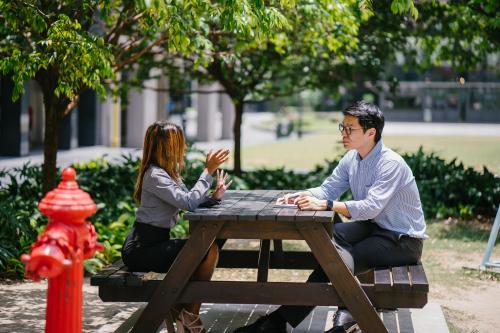This is the third article in a four-part series. Read Part 1, Part 2 and Part 4.
In "Hidden Heroes: Tales from Caregivers Part 1", we met Christine and Nadia, who shared the ups and downs in their respective caregiving journeys. Their stories continued in Part 2, which delved more deeply into their emotional and financial challenges. In the third instalment of this multi-part series, JAYA MYLER looks at how individuals, institutions and communities can play a bigger role in caring for the caregivers in our midst.
Caregivers Alliance Limited (CAL), a non-profit that provides support and training to caregivers of persons with mental health issues (PMHIs) and dementia, advocates for companies and schools to have more empathy for caregivers and to be more understanding to their needs.
For instance, if more employers and schools introduced more flexibility in their policies—say, by availing work/study-from-home arrangements and caregiver leave—caregivers can better balance their multiple responsibilities without jeopardising their jobs or studies.
![]()
Image via rawpixel
Christine, an undergrad, would greatly appreciate more understanding from university administrators if she needed to take an urgent leave of absence or make changes to her schedule. “There've been instances when my brother's relapse would coincide with my mid-year exams,” she says. “I'd be studying at home in spite of the shouting in the background, and just telling myself to accept that I have exams to prepare for, even if my study environment isn't conducive.”
In the working world, flexibility is ever more crucial for caregivers. Nadia shares that she favours working for MNCs over SMEs because in her experience the former's HR practices are more progressive and the management is more sensitive to employees' different needs. "I’m fortunate to have been employed at larger, more international organisations, where I can confidently say to my boss, 'My sister is having a day' or 'I’m having a day' and I wouldn't be questioned," she explains. "I greatly appreciate the culture where I feel safe to tell colleagues I have a sister with special needs and for that reason, I need to take the morning off or come in later every now and then."

Image via Unsplash
Nadia recounts an episode from the time when she was working for an American corporation. "Once, the regional HR representative saw me crying and came over to ask if I was OK. After I told her about my family situation, she invited me into her office. There, she explained that as an employee, there were certain HR benefits I could tap into, such as paid sessions with a therapist.”
Nonetheless, even with supportive employers and schools, it is crucial for caregivers to carve time out for self-care.
Christine finds solace in close friends and her church community. “I take care of myself by confiding in my friends,” she says. “I've known my best friend since primary school and she’s seen what my family has gone through over the years. Whenever I have a very draining day with my brother, it helps a lot just having a listening ear.”
She is additionally grateful to have friends from church—and her faith—to draw strength from. "My church group always motivates me by reminding me that there is hope. On very dark days, I have scary thoughts about losing my brother," she confesses, "but I ultimately believe God will protect my family and bring us to a place of hope again.”

Image via Unsplash
Nadia, on the other hand, finds solace in meditation's restorative effects. “I started meditating since 2016 and that's helped a lot,” she says. “If I skip my 'me-time' for the day, I'd feel very wound up.”
To relax and feel re-energised, Veena from Caregivers Alliance suggests that caregivers take up hobbies and engage in pleasurable activities. CAL regularly organises activities for their members, such as finger painting and reminiscence therapy. "It's so important for them to make time for self-care, whether it's exercising or practising mindfulness,” says Veena.
Equipping caregivers with the necessary education and training is another way to empower them and build confidence.
To this end, CAL offers a Caregivers-to-Caregivers Training Programme (C2C), which includes a 12-week curriculum for caregivers of Persons with Mental Health Issues (PMHIs), and another at 8 weeks for caregivers of Persons with Dementia. "Through these programmes, caregivers will not only learn more about various mental health conditions," says Veena. "They will also acquire new skills to improve in communication and grow in empathy towards the loved ones they are caring for.”
For the benefit of caregivers who are unable to attend the scheduled classes, CAL offers its Individual Training and Support (ITS) programme, which imparts the requisite knowledge and skills while also providing emotional support to the caregivers themselves.

Image via Unsplash
Christine has noticed a very marked difference after her parents underwent caregivers training at CAL. “My mum became more calm,” she describes. “Previously whenever my brother had a breakdown, she'd have a breakdown too, plunging the entire household into a state of chaos. But these days she can handle the situation in a collected manner. If my brother acts up, she'll say, 'Alright this is what we’ll do,' even if it means going to the hospital."
Encouraged by her mother's newfound coping skills that has contributed to more stability at home, Christine herself decided to join CAL's training course to learn how to better support her brother and parents. “I was taught very useful skills about how to communicate effectively and empathise with a person with a mental condition," she explains. "Let's say the other party says to me, I’m feeling very sad because of something that happened today. Rather than say, I’m sure it’s nothing, don’t be affected by it, I could instead acknowledge their feelings and say, I know you must be feeling very sad, it must have affected you a lot. But I’m standing here with you. Applying such techniques in empathy and communication has helped me a great deal in my conversations with my brother.”

Image via Pexels
For the rest of us who want to do our bit to support a caregiver in our midst—whether a family member, colleague, neighbour, friend or acquaintance—but don't know where to start, Christine, Nadia and Veena suggest being a good listening ear.
It all comes down to the little things. Such as acknowledging that you know about the caregiver's additional responsibilities. If your coworker is a caregiver, for instance, Veena says the other colleagues could explore ways to help that team member cover work responsibilities as necessary—the same way they'd cover for someone who's on maternity leave.
“I don’t need someone to sit with me and try to fix my problems,” Nadia clarifies. “What I seek is empathy. I'm not looking for a psychiatrist, only someone to hear me out.”

Image via Unsplash
Christine agrees. “I wish I could open up to more people about my struggles. But sometimes when I do talk to people, they feel like they have to solve my problems, or my older brother’s problems, or have a solution to my family’s challenges," she says. "But that's not what I'm looking for at all. The most helpful thing anyone can do is listen.”
Banner image via Unsplash.
 |
Jaya Myler is a non-profit manager and marketing and communications specialist. She has worked with international NGOs and managed corporate and consumer brands, and has extensive experience with non-profits focused on education, the environment, providing access to clean water and sanitation. Jaya is passionate about the power of collaboration to drive innovation and achieve impact. She has also volunteered extensively with charities in the areas of housing, education and multi-sector partnerships. Jaya, an Australian, has been living and working in Asia for the past eight years, and has called Singapore home for nearly six. Connect with her on LinkedIn. |








Comments